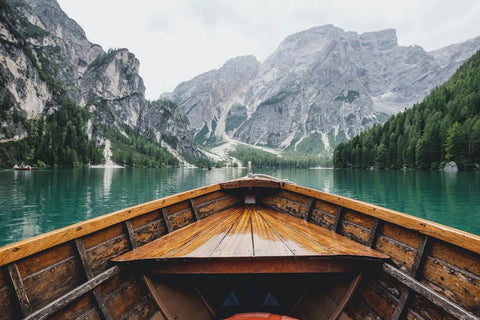Rethinking Travel in a Post-Pandemic World
Since 2020, the Corona pandemic has reshaped the travel landscape, prompting a shift towards local exploration and sustainable choices. As planes sat grounded, cruise ships docked, and trains ran with empty carriages, people rediscovered the beauty of nature in their own backyards. This newfound appreciation raises essential questions: What can we learn from this experience, and how can we integrate sustainable practices into our future travels?
Sustainable Travel: A Paradigm Shift for Mindful Explorers
The pandemic urged a reevaluation of travel habits, emphasizing the importance of sustainability in our journeys. "Sustainable travel" emerged as the guiding principle, advocating for eco-conscious, resource-conserving exploration aligned with nature and local communities. This ethos extends beyond transportation choices, encompassing accommodation preferences and on-site behaviors.

Crafting Your Sustainable Adventure: A Mindful Approach
Sustainable travel begins with a mindset shift. Consider aligning your rest and relaxation needs with environmental consciousness when planning your trip. While each person's idea of the perfect vacation varies, exploring undiscovered local gems and opting for eco-friendly accommodations can redefine your travel experience. The current influx of social media tips on nearby excursions provides a wealth of options to explore your own region.
The distance of your destination should align with the duration of your trip. Ponder whether an intercontinental flight is proportional to a brief escape and if alternative destinations closer to home might offer an equally fulfilling break. Sustainable travel doesn't demand exorbitant costs; it requires creativity and planning. The rewards extend beyond environmental preservation, offering a sense of fulfillment and conscience.

Navigating the Journey: Balancing the CO2 Equation
Choosing the right mode of transportation significantly impacts your travel's carbon footprint. Whether by car, train, or plane, understanding their environmental implications is crucial.
-
Rail Travel: Opting for train journeys, especially for short and medium distances, provides an excellent CO2 balance. Night trains, experiencing a revival, offer a relaxed alternative, ensuring you make the most of your vacation time.
-
Coach Travel: Coaches offer a commendable carbon footprint but may extend travel durations and contribute to road congestion.
-
Car Travel: Traveling by car yields a moderate CO2 balance, contingent on the number of occupants. Consider factors like particulate matter and tire wear, and use online CO2 calculators for clarity.
-
Air Travel: Airplanes, though convenient, rank as climate killers due to their substantial carbon emissions. Consider avoiding flights for distances less than 700 km and opting for direct flights to minimize environmental impact.
-
Cruise Travel: Cruise ships, fueled by heavy oil, top the list as the primary climate offenders. Their emissions rival that of thousands of cars, emphasizing the need to reconsider their environmental impact.
Choosing Sustainable Accommodations: From Tents to Eco-Resorts
Selecting sustainable accommodations plays a pivotal role in your eco-friendly travel choices. Accommodation options range from campgrounds to luxury eco-resorts, each with its own set of eco-friendly practices.
Sustainable hotels prioritize green energy, water conservation, plastic avoidance, eco-friendly facilities, waste separation, and support for local suppliers. Food offerings are often organic, with all-inclusive options posing a challenge to sustainable practices due to excess food wastage.
Certifications such as the Blue Flag, TourCert, or Viabono can guide your choice of sustainable accommodations. Similar platforms and certifications cater to vacation apartments, guesthouses, and campsites, emphasizing environmental compatibility.
For outdoor enthusiasts, selecting environmentally friendly equipment is crucial. Opt for gear free of microplastics and, ideally, recyclable. If backpack space permits, consider a solar panel to charge your devices carbon-neutrally, ensuring your ecological footprint remains minimal.

Mindful Behavior: Leaving a Positive Impact
Practicing sustainability doesn't end with transportation and accommodation choices. Your on-site behavior, akin to your habits at home, can contribute positively to the environment.
-
Leave No Trace: Whether in the wilderness or on the beach, adhere to the principle of leaving no trash behind. Respect nature, keep your distance from wildlife, and stay on marked trails for safety and environmental preservation.
-
Conserve Resources: Save electricity and water, recognizing that water shortages are not limited to southern regions. Even in Central Europe, hot and dry summers can lead to regional water shortages.
-
Choose Local: When buying food on vacation, opt for local markets or unpackaged options to minimize packaging waste and support local businesses. Engaging in local CleanUp campaigns organized by environmental protection organizations allows you to contribute to the community while enjoying your travels.
A Call to Sustainable Action
As we reflect on the impact of the pandemic on our travel habits, let us embrace a sustainable approach to exploration. Sustainable travel not only benefits the environment but also enhances our travel experiences, fostering a sense of responsibility and connection to the places we visit. By making mindful choices, we can contribute to a brighter and greener future, ensuring that the joy of travel remains accessible for generations to come.